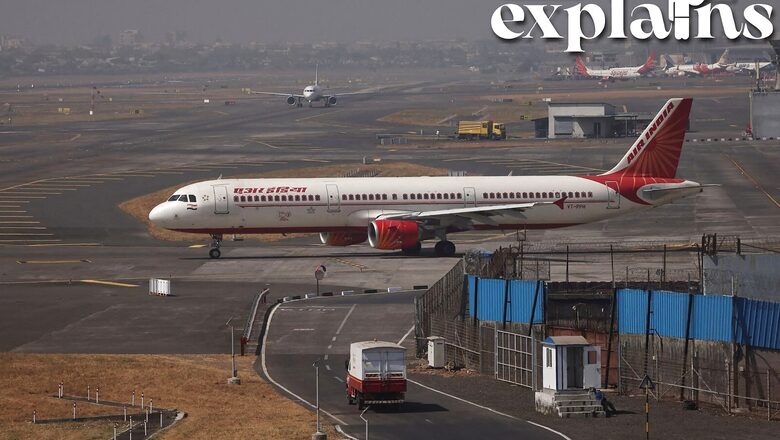
views
Tata Group-owned Air India on Tuesday said it will buy a total of 470 wide-body and narrow-body planes from Airbus and Boeing, and the total deal value is estimated to be $80 billion (around Rs 6.40 lakh crore) as the airline expands its operations.
“The order comprises 40 Airbus A350s, 20 Boeing 787s and 10 Boeing 777-9s wide-body aircraft, as well as 210 Airbus A320/321 Neos and 190 Boeing 737 MAX single-aisle aircraft. The A350 aircraft will be powered by Rolls-Royce engines, and the B777/787s by engines from GE Aerospace. All single-aisle aircraft will be powered by engines from CFM International,” the airline said in a statement.
According to Air India, the first of the new aircraft will enter service in late 2023 and the bulk of the planes are to arrive from mid-2025 onwards. “In the interim, Air India has already started taking delivery of 11 leased B777 and 25 A320 aircraft to accelerate its fleet and network expansion,” it said.
Sources told PTI the total deal value is estimated to be at $80 billion.
What is Tata’s Ambition
Tata Sons and Air India Chairman N Chandrasekaran said the airline is on a large transformation journey across safety, customer service, technology, engineering, network and human resources.
“This order is an important step in realising Air India’s ambition, articulated in its Vihaan. AI transformation programme, to offer a world-class proposition serving global travellers with an Indian heart. These new aircraft will modernise the airline’s fleet and onboard product, and dramatically expand its global network,” he said.
Mark D Martin, CEO of Martin Consulting, said Air India’s induction of the Airbus a350 aircraft will help the airline operate with improved efficiency reliability dovetailed with 35 per cent lower operating cost and over 28 per cent of lesser carbon emissions.
“The strategy with Air India’s 250 aircraft order from airbus falls in line with a global star alliance strategy of offering global connectivity right from India bypassing regional hubs such as Dubai, Abu Dhabi, Doha and Bahrain,” he said.
What Biden Said
Meanwhile, the “landmark” Air India-Boeing deal will create up to 1 million jobs across 44 states in the US, President Joe Biden told Prime Minister Narendra Modi in a call on Tuesday.
While announcing the Boeing-Air India deal on Tuesday, Biden asserted that together with Prime Minister Modi, he was looking forward to deepen the ties between India and the US.
Biden spoke with Modi of India to discuss the “landmark” agreement.
This purchase will support over one million American jobs across 44 states, and many will not require a four-year college degree, Biden said in the call.
The Air India order is Boeing’s third biggest sale ever in dollar value and second in terms of number of planes.
During the call, the two leaders also reaffirmed the strength of the US-India relationship and committed to continue working together and in groups like the Quad to advance economic growth for our two countries and expand cooperation on our shared priorities.
This announcement follows the inaugural launch of the US-India initiative on Critical and Emerging Technology (iCET) last month. The initiative is aimed at expanding the strategic technology partnership and defence industrial cooperation between the governments, businesses, and universities of the two countries.
When Air India Returned to Tata
After 69 years as a government corporation, Air India had returned to the Tata Group in 2022.
The Indian government had purchased a majority interest in Tata Sons in 1953, though founder JRD Tata remained chairman until 1977. As part of a restructuring, the firm was renamed Air India International Limited, and domestic services were transferred to Indian Airlines.
As part of the resurrection plan, the Tata Group had devised a 100-day plan for Air India to enhance the airline’s operational and service standards, including on-time performance and concerns with passenger complaints and call centres, The Economic Times had reported.
After the takeover, the airline had finalised preparations to address passengers as guests and to play a recorded message from Ratan Tata. The airline’s cabin crew workers were also instructed to maintain a healthy body mass index (BMI) and to dress appropriately.
Immediate priorities included greatly improved lunch service and airline communication with crew and ground workers. According to an ET report at the time, experts speculated that changing the culture at Air India would be the most difficult challenge. “There is no contemporary institutional memory within Air India of how the airline used to run under Tata management in the past. Bridging the cultures of the two organisations will thus be a huge issue in the short term, requiring patience and remarkable skill,” Mukund Rajan, former Tata Group Brand Custodian, told ET.
“The major benefit of the Air India acquisition will be apparent when the airline starts to positively influence the brand image of Tatas in global markets. But that will take time, most likely the rest of this decade, and will necessitate significant investments in both human and financial capital,” Rajan had warned, the report had said.
The Tata Group had won a bid to acquire a 100% ownership in Air India, as well as a 50% stake in the ground handling business AISATS. Talace Private Limited, a subsidiary of the Tata Group’s parent company, paid Rs 18,000 crore – around Rs 2,700 crore was paid to the government, with the remainder being Air India loans that the new firm will assume.
With inputs from PTI
Read all the Latest Explainers here




















Comments
0 comment